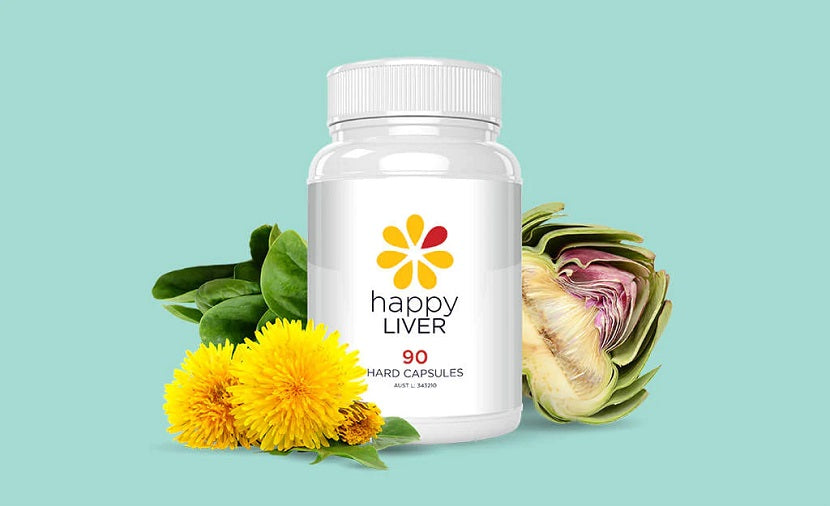How Will Happy Liver Help Me?
By Lauren Jane

Having a healthy liver is vital for maintaining optimal overall health. When the liver becomes imbalanced, congested, or sluggish it can affect us in many ways, and our whole system can become affected.
Ever find yourself waking in the middle of the night, and find it hard to get back to sleep? It could be that your liver is congested and influencing your sleep/wake cycle. This is when your liver is finding it harder to digest food, causing you to wake up.
Or are you experiencing digestive problems such as an upset stomach or bloating? This can also happen when the liver is finding it harder to break down fats.
Or perhaps you are noticing skin problems such as acne, rosacea, or dermatitis? When the liver is sluggish it can provoke changes in our skin health as the toxins in the body are not properly filtered out.
Low mood, weight gain, headaches, and hormonal imbalance are other common signs of a problem with your liver.
These are just some of the ways that an imbalanced liver may be affecting your life and overall health. It can become imbalanced and sluggish when more toxins are ‘coming in’ than can be handled, for example when we consume high amounts of alcohol or sugary food.
So if this is how our body responds when the liver is congested, what can it do when the liver is working at optimal health?
What Does The Liver Do?
The liver has many tasks that keep us healthy. Here are some of the things it does for your body:
- It breaks down and processes fats
- It maintains sex hormone balance (healthy periods and happy menopause) by clearing unwanted sex hormones
- It process the nutrients absorbed from the small intestine
- It stores copper, Vitamin B12, and Vitamin A
- It converts Vitamin D to an active form
- It helps to remove toxins through the bowels
- It filtrates and removes waste from the blood
- It regulates blood sugars which can stop cravings and fatigue
- It maintains healthy triglyceride and cholesterol levels
- It plays a role in iron levels
- It processes medications, alcohol, nicotine and other external toxins
It is important for the liver to be able to do these tasks with ease so that we can sleep well, avoid digestive problems, and feel healthy. But sometimes it needs a little helping hand to work well.
There are things we can do like avoiding recreational drugs, drinking less alcohol, and reducing high-sugar foods in our diet to help our liver to avoid becoming imbalanced.
But what can we do to protect the liver and promote liver health?

Happy Liver: The Natural Approach
Happy Liver is our natural, daily supplement that is easy to take and provides a range of health benefits for your liver. The myriad of therapeutic benefits that come from the ingredients in our Happy Liver formula are scientifically proven to improve healthy liver function so that you can feel healthy and happy.
What can Happy Liver do?
- It protects the liver
- Enhances liver regeneration
- Boosts antioxidant status and reduces free radicals in the body
- Supports natural liver cleansing and detoxification processes
- Promotes healthy digestive system function
- Relieves symptoms of indigestion and digestive discomfort
- Promotes bile flow from the gallbladder and liver
How Does Happy Liver Work?
The ingredients in our Happy Liver blend include: milk thistle, dandelion root, globe artichoke, methionine, cysteine, taurine, glycine, and digestive enzymes lipase and protease. These ingredients play a unique role in healthy detoxification. Learn more about each ingredient below:
St Mary’s Thistle
This herb is renowned for protecting and regenerating the liver. It helps to improve cholesterol levels and fat metabolism. It also supports healthy liver enzyme activity by increasing antioxidants and suppressing inflammation. Healthy liver enzyme activity supports healthy digestion and can improve digestive symptoms such as bloating, cramps, and constipation.
Globe Artichoke
Globe artichoke is another thistle species that also has therapeutic effects on both the liver and cholesterol. It assists with indigestion and is commonly prescribed for gallbladder concerns, loose/oily stools, nausea, bloating, gas, or gastrointestinal ulcers.

Dandelion Root
Dandelion supports the liver by increasing the potent antioxidant, glutathione. It has strong, bitter properties which support bile production, healthy digestion and balanced blood sugars.
Methionine, Taurine & Cysteine
This power trio of amino acids has been included as a means to boost your antioxidant status, prevent cell damage, and better detoxify chemicals moving through the liver.
Methionine is an amino acid that cannot be made by the body and therefore needs to be consumed through protein rich foods or supplementation. It can help detoxify heavy metals, clear out nasty oestrogens, and prevent liver damage.
Taurine specifically helps bile production and boasts anti-inflammatory properties. It’s also well known for enhancing energy and brain function which is why it’s a common inclusion in energy drinks.
Protease & Lipase
These are both digestive enzymes which help break down proteins and lipids (fats). These are in the Happy Liver formula because of the strong relationship between digestion and our liver. Both these systems work together closely to ensure healthy detoxification and wellbeing.
Who Can Take Happy Liver?
If you have been experiencing symptoms related to cholesterol, skin, hormonal, or digestive issues because of a sluggish liver, then Happy Liver can improve these symptoms and promote liver health.
We also recommend this product to people who:
- Consume alcohol, use drugs, or smoke cigarettes
- Have a diet that is high in sugar
- Have liver concerns
- Work in a job where you are exposed to chemicals
Tips For Getting Started
So you’ve decided to take Happy Liver to improve your symptoms and protect your liver’s health. Now let’s get started! Here are just some of our tips for when you are starting to use this supplement so that you can get its full benefits.
- Start slow. We do get a few comments from some women who get headaches or feel nauseous to start with. This actually shows how much you need some liver support. So just start slowly and build up if you feel this way.
- Take it in the morning or at lunch with food. The dose is 3 caps per day however we suggest to start with 1 per day. Taking it in the evening may disrupt your sleep to start with. So when you start taking it, have it in the morning and then work your way to evening hours later on.
- Happy Liver contains digestive enzymes specifically designed to help you digest proteins and fats better. So don’t be surprised if your digestion improves and bloating goes away!
- If you have hormone metabolism issues resulting in excessive oestrogen levels then be a little careful when first getting started. This is because oestrogen can cause headaches when the body starts to release it. So just go slowly as mentioned at the start.
- You may experience more regular and consistent bowel motions. This is a good thing.
- You should notice your energy levels and skin health improve over the coming weeks as well.

You can feel the benefits of Happy Liver upon your digestion as soon as it reaches your digestive tract. However, it can take longer to see a change in chronic conditions such as hormonal imbalance, skin issues or fatty liver syndrome.
Frequently experiencing indigestion, bloating, or skin problems can be exhausting. But when we take action we can improve symptoms and feel healthier. Happy Liver can help you get there.
For optimal results, take our Happy Liver supplement consistently for at least three months, and start to see your symptoms improve and feel your liver get the support it needs! If you have any questions or concerns then connect with our practitioner team. You can reach any of our health practitioners through our Live Chat or via our Contact Form.

REFERENCES
Abenavoli et al. (2018). Milk thistle (Silybum marianum): A concise overview on its chemistry, pharmacological, and nutraceutical uses in liver diseases. Phytotherapy Research. Nov;32(11):2202-2213.
https://doi.org/10.1002/ptr.6171
Fatima T, Bashir O, Naseer B, Hussain SZ. (2018). Dandelion: Phytochemistry and clinical potential. Journal of Medicinal Plant Studies. 198-202.
https://www.plantsjournal.com/archives/2018/vol6issue2/PartC/6-2-42-182.pdf
Froese DS, Fowler B, Baumgartner MR. (2019). Vitamin B 12 , folate, and the methionine remethylation cycle-biochemistry, pathways, and regulation. Journal of Inherited Metabolic Disease. Jul;42(4):673-685.
https://doi.org/10.1002/jimd.12009
Mahboubi, M. (2018). Cynara scolymus (artichoke) and its efficacy in management of obesity. Bulletin of Faculty of Pharmacy, Cairo University. Volume 56, Issue 2:115-120.
https://doi.org/10.1016/j.bfopcu.2018.10.003
Marques et al. (2017). Cynara scolymus L.: A promising Mediterranean extract for topical anti-aging prevention. Industrial Crops and Products. Vol.109:699-706.
https://www.cabdirect.org/cabdirect/abstract/20183012245
Chiang J. (2014).Liver Physiology: Metabolism and Detoxification. Pathobiology of Human Disease. pp.1770-1782.
https://doi.org/10.1016/b978-0-12-386456-7.04202-7
Mora SI, García-Román J, Gómez-Ñañez I, García-Román R. (2018). Chronic liver diseases and the potential use of S-adenosyl-L-methionine as a hepatoprotector. European Journal of Gastroenterology & Hepatology. Aug;30(8):893-900.
https://doi.org/10.1097/meg.0000000000001141
Mullur R, Liu YY, Brent GA. (2014). Thyroid Hormone Regulation of Metabolism. Physiological Reviews. Apr; 94(2): 355–382.
https://doi.org/10.1152/physrev.00030.2013
Ozougwu, JC. (2017). Physiology of the liver.International Journal of Research in Pharmacy and Biosciences. Vol 4:8, pp 13-24.
https://ijrpb.org/papers/v4-i8/3.pdf
Ramani K & Lu SC. (2017).Methionine adenosyltransferases in liver health and diseases. Liver Research. Vol 1:2 Sept:03-11.
https://www.sciencedirect.com/science/article/pii/S2542568417000265
Schaffer SW, Ito T, Azuma J. (2014). Clinical significance of taurine. Amino Acids. 2014 Jan;46(1):1-5.
https://doi.org/10.1007/s00726-013-1632-8
Miraj S & Kiani S. (2016). Study of therapeutic effects of Cynara scolymus L.: A review. Der Pharmacia Lettre. 8 (9):168-173.
https://www.scholarsresearchlibrary.com/articles/study-of-therapeutic-effects-of-cynara-scolymus-l-a-review.pdf
Shen M & Shi H. (2015). Sex Hormones and Their Receptors Regulate Liver Energy Homeostasis. International Journal of Endocrinology. Article ID 294278.
https://doi.org/10.1155/2015/294278
Valková V, Ďúranová H; Bilčíková J, Habán M. (2020). Milk thistle (Silybum marianum): a valuable medicinal plant with several therapeutic purposes. Journal of Microbiology, Biotechnology and Food Sciences. Vol 9:4.
http://dx.doi.org/10.15414/jmbfs.2020.9.4.836-843
Wang X, Zhang Z, Wu SC. (2020). Health Benefits of Silybum marianum: Phytochemistry, Pharmacology, and Applications. Journal of Agricultural and Food Chemistry. 68, 42, 11644–11664.
https://doi.org/10.1021/acs.jafc.0c04791
Yin et al. (2015). L-Cysteine metabolism and its nutritional implications. Molecular Nutrition & Food Research. Jan;60(1):134-46.
https://doi.org/10.1002/mnfr.201500031







Leave a comment
This site is protected by hCaptcha and the hCaptcha Privacy Policy and Terms of Service apply.